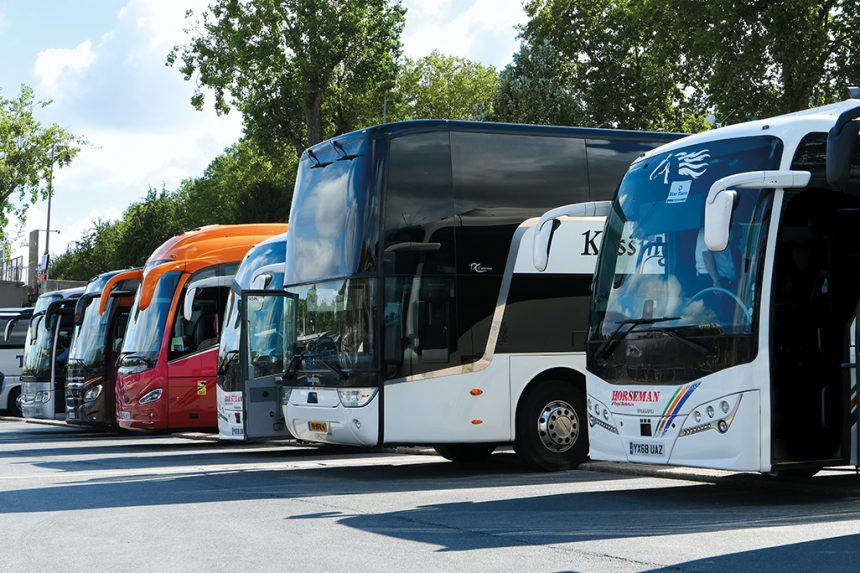British coach operators travelling to France have been fined by French enforcement officers for allegedly carrying incorrect documentation — despite fully complying with post-Brexit legal requirements under the Interbus Agreement.
Trade bodies say the issue surfaced in Paris last year but intensified in recent months along France’s north-western coast, including in Calais, Boulogne and Dunkirk, with some operators facing on-the-spot fines of up to €750 per vehicle. In multiple instances drivers have been detained for hours, threatened with arrest, or been warned their vehicles would be impounded if fines were not paid immediately.
According to the Confederation of Passenger Transport (CPT), the fines have been issued because French enforcement teams wrongly expect coaches to carry an EU Community O-Licence as required by Regulation 1073/2009, which has not applied to UK-registered vehicles since the country’s departure from the EU.
The UK became a contracting party to the Interbus Agreement on 1 January 2021, allowing for the continuation of occasional passenger transport services, such as coach tours. The UK also agreed a Protocol to the Interbus Agreement extending it to cover scheduled services, which was signed on 19 October 2022.
The Interbus Agreement prescribes that a certified copy of the International O-Licence must be carried and presented to any inspecting authority.*
“The Office of the Traffic Commissioner issues a certified copy of the O-Licence with wording to the effect of ‘certified true copy’ written across the top,” explains CPT Operations Manager Gavin Miller. “That’s what’s deemed to be the required document. But we think a particular team of French examiners is applying the old EU rules and mistakenly expecting security features and documents that no longer apply to UK operators.”
 Late June surge
Late June surge
Although reports of the enforcement activity emerged last year and had been initially treated as isolated incidents, CPT says it became alarmed after a surge in fines in late June, when multiple UK coaches were stopped and penalised in the Calais region.
“That pricked our ears up,” says Mr Miller. “We dug into it, got in touch with DVSA, which made contact with its counterpart in France, the Direction Régionale de l’Environnement, de l’Aménagement et du Logement (DREAL), to point out the error. DREAL seemed to go quiet when this was highlighted.”
RHA meanwhile reports that at least five of its coach members have had fines or warning notices in France across the same period.
CPT and DVSA have since escalated the matter to the Department for Transport (DfT). routeone understands DfT is now pursuing this at a diplomatic level. Meanwhile, the International Road Transport Union (IRU) has also been engaged to support CPT’s efforts in raising the issue with France’s equivalent body, the Fédération Nationale des Transports de Voyageurs (FNTV).
Commandery Coaches, which sends up to six vehicles abroad weekly, has shared with routeone details of two separate run-ins with French authorities in the same week, despite providing all required paperwork.
William Rowley, Director of Commandery Coaches, says the ordeal began when one of his vehicles was challenged at the Parc Bagatelle amusement park in Rang-du-Fliers, on the Opale coast. His was one of several other British coaches stopped by authorities, following which every vehicle was checked for a Community O-Licence. “One of the other operators’ drivers did not have means to pay a fine, and he was threatened with arrest. It caused a lot of confusion and stress, and that driver felt he was being ganged up on — all for a document that does not exist,” Mr Rowley recalls.
Despite carrying extensive documentation, including an older copy of the now-defunct blue Community O-Licence for reference, Mr Rowley’s attempts to reason with authorities over the phone failed. “I tried to explain that the document has been replaced by a requirement for a certified, true copy of the international O-Licence, but that wasn’t enough. I was threatened with a €1,500 fine, or €750 if I paid immediately. If it was not paid, the vehicle would be impounded.”
In a second incident, just days later, that same driver was pulled over again, near a toll booth on the A26 route to Calais.
“This time he was greeted by eight agents who clambered on the coach and who didn’t speak a word of English,” continues Mr Rowley. “They asked the driver to present this supposed missing document again. I had sent the driver away with back-up articles from the government website, including supporting documents that clearly state that since Brexit a certified, true copy of the international O-Licence would suffice. I was told it was invalid and had to pay another on-the-spot fine of €750. The coach group was annoyed, and missed their next appointment at Desvres. If I was to have had any more incidents, I would reconsider travel to Europe.”

‘No official resolution’
Although CPT reports that enforcement activity has abated since 1 July, no official resolution has yet been confirmed. DfT continues to liaise with French authorities but Mr Miller notes that things are still “up in the air”.
In the meantime, CPT has issued guidance to members, publishing anonymised examples of the certified true copy of the international O-Licence and highlighting Article 20 of the Interbus Agreement, which outlines documentation requirements.
Trade bodies hope ongoing discussions supported by IRU and FNTV will result in the refund of incorrectly levied fines.
For now, Mr Miller says it is essential to remain vigilant, and operators in France should be fully literate in the Interbus requirements, and carry all supporting documentation. RHA says DfT has had positive engagement with the Interbus secretariat and France, but that coach numbers in France are now lower than during the peak season, so “no accurate conclusion can be drawn” for now.
*Section IX, Article 20 of the Interbus Agreement states that ‘a certified true copy of the licence to perform carriage by means of international occasional services by bus and coach… shall be kept on the bus or coach and shall be presented at the request of any authorised inspecting officer.’


























